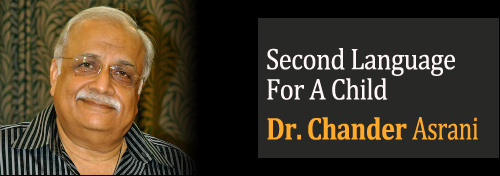Second Language For A Child
My 2.3 years old angel has come to visit us from Chennai. Watching her play/scribble and hearing her talk over two days, prompted me to do some research; talk to some friends. I came up with some astonishing facts. I would like to share these @Parentous.
Second language for your child.
When N, my angel (granddaughter) saw me at the airport, she smiled and said, “Nanu, how are you?” “Fine, My bebo” I replied and added “Where is papa?” “Papa, home”, was the reply.
Few hours later, her papa called and I over heard, “Papa main Nanu ghar, Bombay main”. I was impressed and asked B, my daughter “How does she speak and follow both English and Hindi?”
“She talks in both languages and we correct whenever she makes mistakes. And you won’t believe she knows more words in Tamil than I know!”, my daughter replied. B is married in a Punjabi family settled in Chennai and has managed to learn a few odd words of Tamil. N hears words from maids and is learning to use them wherever she can.
Just last week, I had written about the father who was pushing his son to learn Mandarin and here I was watching a 27-month-old, effortlessly switching between languages with no special effort put in by parents.
I wondered whether this bi/multi-linguistic skill is desirable. I got down to do some research and here are the findings:
Your kid, who is just beginning to utter his first few words, begins to take giant steps in language development at 18 months of age; his toddler vocabulary increases at a surprising rate, helping his word bank increase from few words at 1 to about 1000-2000 by the time he is 3.
A brain that comprehends 2 (or more) languages works more effectively and efficiently, than one that handles only one language, on specific types of tasks. Such a robust control mechanism can be equated with a circuit breaker system (that switches off the language that is not needed). I will give an example, if a child is telling a Hindi speaking maid“Paani chahiye”, then the part of brain that would have other wise said “Give water” switches off. Kids (even 2-year-old) who comprehend two languages have far superior skills in tuning out distractions – means they can focus more on whatever is (more) relevant at that particular time. You will agree, this can become a great life skill as they grow up.
More often than not, a child learns two languages since family members speak one language at home and child learns English through nursery rhymes. In a family that speaks English as the main language, there is usually a native language that parents/grandparents speak. This is the most natural way for a child to learn more than one language.
Although this research is exciting, we must make sure that we are careful about how we introduce young children to additional languages. Wrong approach may even cause a child to never want to learn that/another language ever again.
How to teach second language to your child?
- Reading to the child: Start by reading stories, loudly, to your children in a new language over and over again and you will see things will start to make sense slowly. What happens is, your child’s brain uses its stronger language to understand the story before applying that knowledge to his weaker language. Don’t even expect them to understand anything in the beginning; the brain is in training mode.
- Audio tracks: We have been singing lullabies to children, without worrying whether the kid can comprehend it or not and have seen that very soon they start mouthing same words. Sing to your child in a language other than one spoken at home – soothing ones, and see the results. Songs that include some form of movement are preferable.
- Videos: I am not at all suggesting that you place children alone in front of a TV or video to teach a language; videos can still be very useful, enjoyable and effective learning tools when used cautiously. YouTube is an excellent source!
- Conversations: By far, the best way to help children learn a language is by speaking to them in that language. No need to hire tutors, send kids to classes, etc. I am sure most families have at least one parent who is fluent in a second language; this can be used as an advantage.
These are just a few ways that your child can listen to and use the new language. Language learning shouldn’t be a torture either for parents or for children. Definitely, no pushing!
Remember that language learning is a long-term adventure. It takes consistent language exposure over a long period of time to see real results.
Finally, I spent sometime to find a genetic link to explain multi linguistic capabilities of a child (I speak six languages with fluency and wanted some credits) till I came across –
“Language learning isn’t in genetic code; it is a learned behaviour”.
I would invite parents to share their views and experiences.
Dr Chander Asrani, father to three daughters and grand father to one, is a post-graduate in Family Medicine. He has over 35 years in clinical practice, launched www.growingwell.com in 2000 and since then has been writing on various subjects. Know more about him at about.me/drasrani.

